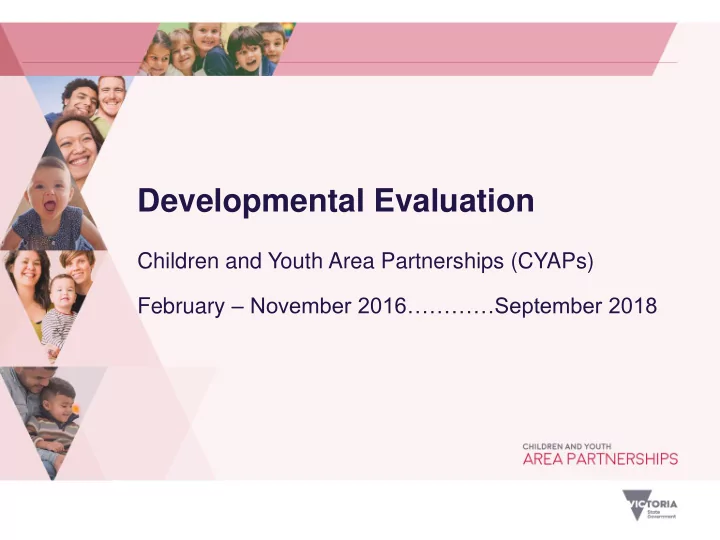

Developmental Evaluation Children and Youth Area Partnerships (CYAPs) February – November 2016…………September 2018
Background Vision For all children and young people to grow-up happy, healthy, resilient, engaged and able to reach their potential
Collective Impact
Developmental Evaluation + Collective Impact + Timing Developmental Evaluation Knowledge Monitoring and Development Accountability Evaluation Evaluation Summative Evaluation Formative Evaluation Source: Mark Cabaj, Here 2 There Consulting
Why CYAPs chosen a DE:
WHAT NEXT WHAT Implications for What you observe future action SO WHAT Your reflections on that
Outer East Children and Youth Area Partnership Key Directions 2016
Outer East Children and Youth Area Partnership Key Directions 2016 1. Support the learning and development of all children and young people, particularly those who are at risk of disengaging Intent of or who have disengaged; and CYAP 2. The creation of safe and supportive communities and environments in which children live free of abuse and neglect. 2. We want children and young people who are healthy, 1. We want families and communities that are cohesive, Outcome meeting educational milestones and equipped with the strong and safe for women and children skills to successfully transition to adulthood 1 2 3 4 5 6 i. Primary Prevention activity led by vi) Inspiring OECYAP iii) Primary v) Out of Home Independence: ii. Primary Focus Members Prevention iv) Prevention Care Regional Educational and Prevention Areas (internally as activity in local Matters Implementation Employment through sport* workplaces/ businesses* Group Outcomes for externally as Care Leavers service providers)* Objectives/ Objectives and Strategies TBC Objectives and Strategies TBC Strategies Indicators TBC (to be informed by TFER Evaluation Indicators Indicators TBC (to be developed by each working group) Framework, EMSIC data work and State-wide FV Index) 7 vii) Out of Home Care Youth Advisory Group Steering Committee Principles Co-design, Collective Impact *Agreement that any activity undertaken will link to and support Together for Equality and Respect: A Strategy to Prevent Violence Against Women in Melbourne’s East 2013– 2017 .
WHAT NEXT WHAT Implications for What you observe future action SO WHAT Your reflections on that
Scenario A Scenario B
So What? What Next? Key Reflections Legacy Pivot, find our place, clarify Doing too much?! our identity Service integration, not Recommit to key principles collective impact Co-design and action Embed co-design and action learning builds momentum learning Define enabling behaviours, Difference in role/style of mindsets and values for CI leadership for collective and systems change impact and systems change
What made it work? • Focus on deep learning • Coaching and capability building – ‘peeking behind the curtain’ • Fertile Soil and Supportive Context • ‘Outside Looking In’
What went well
Events Events Behaviour Behaviour Systems Structures Systems Structures Mental Models, Values, Assumptions Mental Models, Values, Assumptions Future System Current System Adapted from Scharmer O, The Essentials of Theory U: Core Principles and Applications , 2018
Mental Models, Values and Assumptions • Learned Helplessness • Learned Hopefulness • External Accountability • Internal Accountability • Problem Solving • Solution Building • Expert Mindset • Open to learning mindset • Short-termism • Long-termism • Scarcity • Abundance • Ego-centric • Eco-centric • ‘Other’ or ‘System’ to Blame • Collective Accountability
Brighter Futures Transformation Pilot
Key learnings from the DE process • Risk of falling into traditional contract manager/ provider relationship • Dual role of evaluator/coach • Importance of the immersion of evaluator in the team • Time factor/resourcing • The importance of readiness to undertake a DE
How did the DE transform CYAPs The voices of the lived experience and community Understanding the role of a backbone The value of strategic learning and evaluation Tools to build understanding and capacity Understanding what is needed to support the work at each stage New directions for the work
Recommend
More recommend